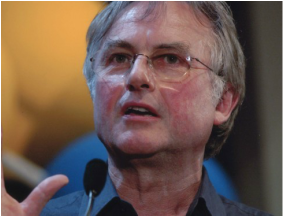
12
Mutation is random; natural selection is the very opposite of random.
—Richard Dawkins in The Blind Watchmaker, 1986.
11
If there is only one Creator who made the tiger and the lamb, the cheetah and the gazelle, what is He playing at? Is he a sadist who enjoys spectator blood sports?
—Richard Dawkins in River Out of Eden, 1995.
10
There are all sorts of things that would be comforting. I expect an injection of morphine would be comforting – it might be more comforting [than religion] for all I know. But to say that something is comforting is not to say that it's true.
—Richard Dawkins in an Interview by Sheena McDonald, 1995.
9
We are here talking about the fact of evolution itself, a fact that is proved utterly beyond reasonable doubt. To claim equal time for creation science in biology classes is about as sensible as to claim equal time for the flat-earth theory in astronomy classes. Or, as someone has pointed out, you might as well claim equal time in sex education classes for the stork theory. It is absolutely safe to say that if you meet somebody who claims not to believe in evolution, that person is ignorant, stupid or insane.
—Richard Dawkins in "Put Your Money on Evolution", The New York Times Review of Books, 1989.
8
You know what it's like to not believe in a particular faith because you're not a Muslim. You're not a Hindu. Why aren't you a Hindu? Because you happen to have been brought up in America, not in India. If you had been brought up in India, you'd be a Hindu. If you had been brought up in Denmark in the time of the Vikings, you'd be believing in Wotan and Thor. If you were brought up in classical Greece, you'd be believing in Zeus. If you were brought up in central Africa, you'd be believing in the great Juju up the mountain. There's no particular reason to pick on the Judeo-Christian god, in which by the sheerest accident you happen to have been brought up and ask me the question, "What if I'm wrong?" What if you're wrong about the great Juju at the bottom of the sea?
—Richard Dawkins answering audience questions after a reading of The God Delusion, 2006.
7
Like immune-deficient patients, children are wide open to mental infections that adults might brush off without effort.
—Richard Dawkins in Viruses of the Mind, 1993.
6
What worries me about religion is that it teaches people to be satisfied with not understanding the world they live in.
—Richard Dawkins in Heart Of The Matter: God Under The Microscope, BBC, 1996.
5
An atheist is just somebody who feels about Yahweh the way any decent Christian feels about Thor or Baal or the golden calf. As has been said before, we are all atheists about most of the gods that humanity has ever believed in. Some of us just go one god further.
—Richard Dawkins in TED Talk on Militant Atheism, 2002.
4
The universe we observe has precisely the properties we should expect if there is, at bottom, no design, no purpose, no evil and no good, nothing but blind, pitiless indifference.
—Richard Dawkins in River Out of Eden, 1995.
3
We are going to die, and that makes us the lucky ones. Most people are never going to die because they are never going to be born. We privileged few, who won the lottery of birth against all odds, how dare we whine at our inevitable return to that prior state from which the vast majority have never stirred?
—Richard Dawkins in Unweaving the Rainbow, 1998. (To be read at his own funeral.)
2
The feeling of awed wonder that science can give us is one of the highest experiences of which the human psyche is capable. It is a deep aesthetic passion to rank with the finest that music and poetry can deliver.
—Richard Dawkins in Unweaving the Rainbow, 1998.
1
You could give Aristotle a tutorial. And you could thrill him to the core of his being. Aristotle was an encyclopedic polymath, an all time intellect. Yet not only can you know more than him about the world, you also can have a deeper understanding of how everything works. Such is the privilege of living after Newton, Darwin, Einstein, Planck, Watson, Crick and their colleagues.
—Richard Dawkins in the Richard Dimbleby Lecture: Science, Delusion and the Appetite for Wonder, 1996.
And I think it's safe to say after reading through this list, that it's been a privilege to live after Richard Dawkins as well. I look forward to hearing more from him tomorrow and in the years ahead as well.

